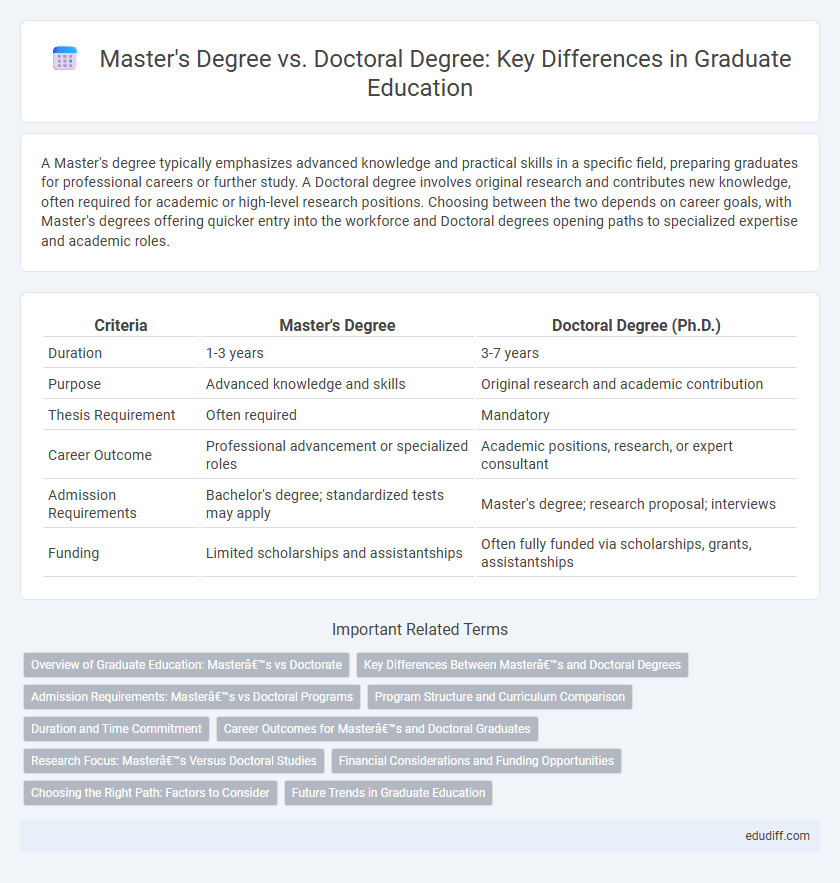A Master's degree typically emphasizes advanced knowledge and practical skills in a specific field, preparing graduates for professional careers or further study. A Doctoral degree involves original research and contributes new knowledge, often required for academic or high-level research positions. Choosing between the two depends on career goals, with Master's degrees offering quicker entry into the workforce and Doctoral degrees opening paths to specialized expertise and academic roles.
Table of Comparison
| Criteria | Master's Degree | Doctoral Degree (Ph.D.) |
|---|---|---|
| Duration | 1-3 years | 3-7 years |
| Purpose | Advanced knowledge and skills | Original research and academic contribution |
| Thesis Requirement | Often required | Mandatory |
| Career Outcome | Professional advancement or specialized roles | Academic positions, research, or expert consultant |
| Admission Requirements | Bachelor's degree; standardized tests may apply | Master's degree; research proposal; interviews |
| Funding | Limited scholarships and assistantships | Often fully funded via scholarships, grants, assistantships |
Overview of Graduate Education: Master’s vs Doctorate
Master's degrees typically require 1-2 years of coursework and emphasize advanced knowledge and professional skills in a specialized field, while doctoral degrees demand 4-7 years of original research culminating in a dissertation that contributes new knowledge. Master's programs often serve as a pathway to professional advancement or doctoral studies, whereas doctoral programs prepare graduates for academic, research, and high-level professional careers. Understanding the distinct goals, time commitments, and academic rigor is crucial for prospective graduate students in selecting between a master's and a doctoral degree.
Key Differences Between Master’s and Doctoral Degrees
Master's degrees typically require one to three years of study focused on advanced knowledge and practical skills within a specific field, often culminating in a thesis or comprehensive exam. Doctoral degrees demand several years of original research, contributing new knowledge through a dissertation, and prepare graduates for academic, research, or high-level professional roles. The level of academic rigor, research intensity, and career opportunities significantly differ between these graduate degree types.
Admission Requirements: Master’s vs Doctoral Programs
Master's degree programs typically require a bachelor's degree, standardized test scores like the GRE, letters of recommendation, and a statement of purpose for admission. Doctoral degree programs demand more rigorous criteria, including a master's degree or equivalent, a strong research proposal, extensive academic records, and sometimes published work or relevant professional experience. Admission committees for doctoral programs emphasize research potential and alignment with faculty expertise more heavily than master's programs.
Program Structure and Curriculum Comparison
Master's degree programs typically span 1 to 2 years and emphasize coursework with a combination of theoretical knowledge and practical application, often culminating in a capstone project or thesis. Doctoral degree programs extend over 3 to 6 years, focusing heavily on original research, dissertation development, and contributing new knowledge to the field, with minimal coursework after initial stages. The curriculum for a master's degree is designed for skill specialization and professional advancement, whereas doctoral curricula prioritize advanced research methodologies and scholarly publication.
Duration and Time Commitment
A Master's degree typically requires 1 to 3 years of full-time study, making it a shorter commitment compared to a Doctoral degree. Doctoral programs usually demand 4 to 7 years, involving extensive research, coursework, and dissertation completion. The time commitment for a PhD often exceeds that of a Master's due to the depth of study and original research required.
Career Outcomes for Master’s and Doctoral Graduates
Master's degree graduates often experience quicker entry into professional roles with enhanced salary prospects, particularly in fields like business, engineering, and education. Doctoral degree holders typically pursue careers in academia, research, and specialized industries, enjoying higher levels of authority, research opportunities, and potential for long-term career advancement. Employment rates for doctoral graduates are strong in STEM and healthcare sectors, while master's graduates benefit from broader applicability across diverse industries.
Research Focus: Master’s Versus Doctoral Studies
Master's degrees concentrate on developing advanced knowledge and research skills with a strong emphasis on applied or theoretical projects, often culminating in a thesis or capstone project. Doctoral degrees prioritize original, in-depth research contributions that expand existing knowledge, requiring candidates to produce a dissertation that addresses novel problems or hypotheses. The scope and scale of research in doctoral studies demand extensive literature review, methodology design, data collection, and analysis, positioning it as a pathway to expert specialization and academic or professional research careers.
Financial Considerations and Funding Opportunities
Master's degrees generally require less financial investment compared to doctoral degrees, with tuition fees typically ranging from $20,000 to $50,000 annually for domestic students. Funding opportunities such as scholarships, teaching assistantships, and research grants are more limited for master's programs but plentiful at the doctoral level, where stipends often cover tuition and living expenses. Doctoral candidates benefit from extensive institutional funding and external fellowships, making the overall financial burden potentially lower despite the longer duration of study.
Choosing the Right Path: Factors to Consider
When choosing between a Master's degree and a Doctoral degree, consider career goals, time commitment, and research interests. Master's programs typically require 1-3 years and offer advanced professional skills, while Doctoral degrees demand 4-7 years of intensive research for academic or specialized careers. Evaluate industry demands, funding opportunities, and personal motivation to ensure alignment with long-term objectives.
Future Trends in Graduate Education
Master's degrees continue to grow in popularity due to their shorter duration and focus on practical skills, aligning with the increasing demand for specialized professionals in industries like technology and healthcare. Doctoral degrees remain essential for driving advanced research and academic leadership, particularly as interdisciplinary and data-driven fields expand globally. Emerging trends highlight hybrid and online graduate programs, which enhance accessibility and accommodate lifelong learning, reflecting the evolving landscape of higher education.
Master's Degree vs Doctoral Degree Infographic

 edudiff.com
edudiff.com